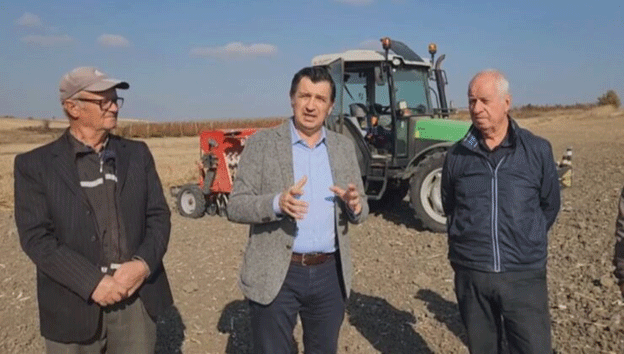In Edirne, a province in Turkey’s northwestern region, farmers are facing a major agricultural challenge due to the persistent drought that has gripped the area. The lack of rainfall since May has left the soil dry and cracked, forcing farmers to sow their wheat crop in conditions that are far from ideal. These farmers are taking a significant risk, hoping that their efforts will not be wasted, as the wheat may fail to germinate or produce a viable harvest.
Hüseyin Öztürk, a local wheat farmer, shared his concerns: “Since May, there has been no rain. The seeds are falling into the cracks in the soil, and we can’t decide whether to plant or not. It’s a difficult situation.” He, like many other farmers in the region, is faced with the choice of whether to take the risk of sowing wheat or to wait, unsure when or if rain will come.
Drought and Its Impact on Wheat Planting
As climate change increasingly affects weather patterns globally, delayed sowing has become more common. Dr. Okan Gaytancıoğlu, Associate Professor at Namık Kemal University’s Faculty of Agriculture, highlighted the significant drought that is exacerbating the situation. “In the past, wheat planting would have been done by October. However, due to global climate change, wheat sowing has been delayed, primarily because of the drought,” said Gaytancıoğlu during his visit to Kuzucu village in Havsa district. He stressed that this unusual pattern of winter drought is a result of climate change, noting that the region typically experiences heavy winter rains and snow that replenish underground water sources and nourish crops. However, this year, the ground remains dry, with cracks appearing in the soil, leaving farmers uncertain of their crop’s success.
The soil moisture levels are dangerously low, and the underground water supply, which is essential for supporting crops, is largely depleted. “The underground water is completely dry,” Gaytancıoğlu remarked. “The situation is critical for farmers who must now choose between dealing with the rising costs of inputs like fuel and fertilizers or facing the consequences of drought.”
Farmers Face Uncertainty Over Germination and Yield
The uncertainty surrounding the wheat crop’s potential is a major concern for farmers in the region. Sami Öztürk, another farmer, expressed his frustration: “We are planting the seeds, hoping that rain will come. If the rain is insufficient, the wheat may not sprout properly, or it will dry out even if it does. If the rain is too little, the germination will be uneven, and the crop will not thrive.”
The lack of adequate irrigation infrastructure further complicates matters. Although some farmers are turning to irrigation, it is often insufficient for meeting the needs of their crops in such extreme conditions. The situation calls for effective drought management strategies and more resilient farming techniques.
Climate Change and Its Effect on Agriculture
The situation in Edirne highlights the growing impact of climate change on global agriculture. As extreme weather events such as droughts and irregular rainfall patterns become more frequent, agricultural practices need to evolve to ensure sustainability and productivity. According to IPCC (Intergovernmental Panel on Climate Change) reports, the frequency of climatic extremes is expected to increase, posing a significant challenge to crop production in many regions, including Turkey.
For farmers, this means that traditional agricultural practices may no longer be enough. There is a need for investment in climate-resilient crop varieties, improved irrigation techniques, and efficient water management systems to safeguard future harvests. Additionally, policy support is crucial to help farmers mitigate the risks posed by these changing conditions.





